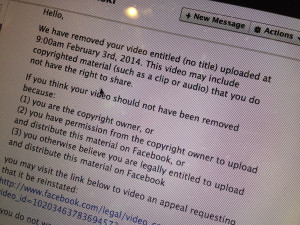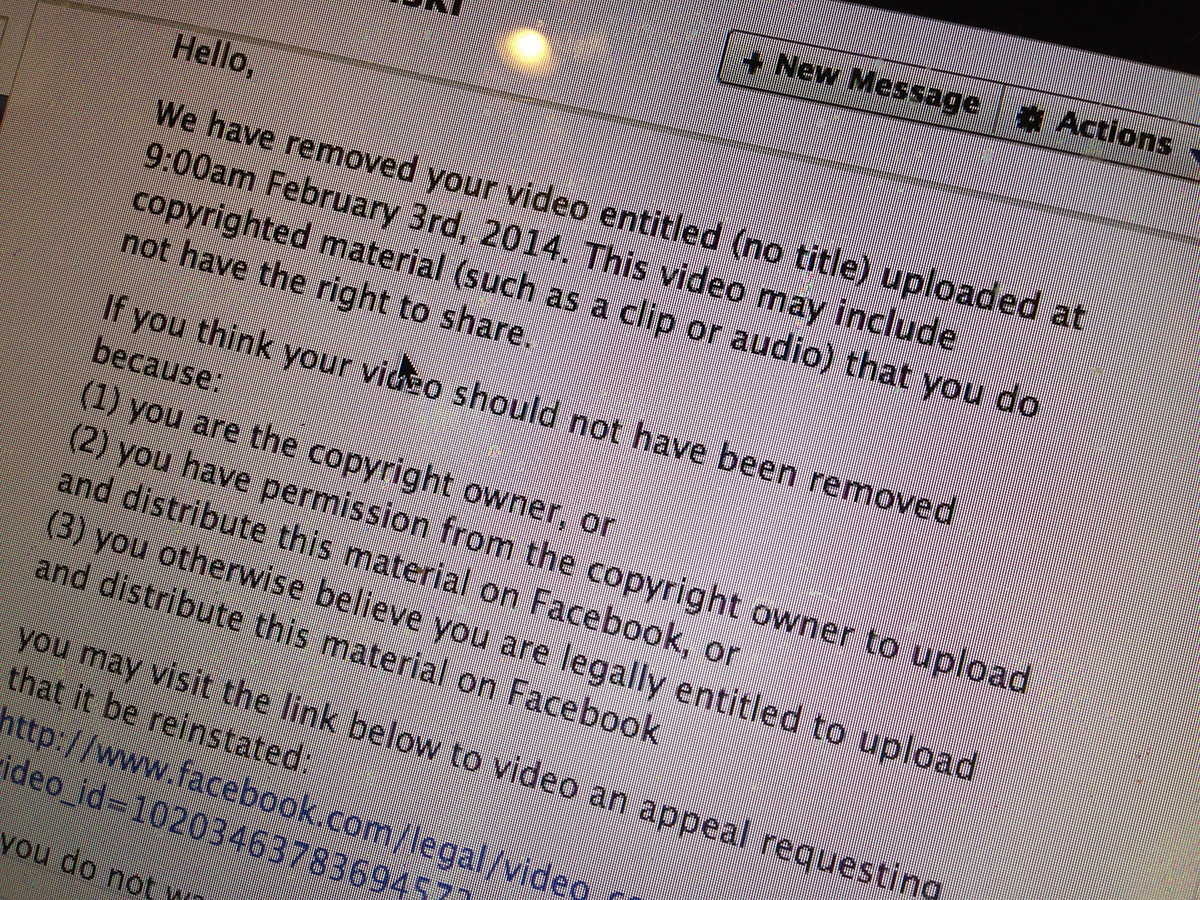Take Down Abuse: From Harry Potter to LEGOs

The actual takedown notice received over a 45 second stop-action film by a 10 year old.
Do you know what’s worse than receiving a DMCA takedown notice? Receiving a Facebook takedown notice that gives no indication of who your accuser is.
Last week, with snow blanketing much of the nation and kids everywhere bored out of their minds and stuck indoors, my friend Kathryn in Detroit put her ten year old son, Henry, to work being creative. Using his new LEGO set, the built-in tools in iMovie, a camera on a tripod, his fantastic imagination, and many hours of snow day time, Henry created a stop-motion movie starring LEGO minifigures and a LEGO garbage truck. He wrote the script himself, and used the royalty-free music built into iMovie for his 45 second masterpiece, entitled “Compactor Attacker.” Kathryn uploaded the video to Facebook on Monday, without a title, to share with her small circle of friends (setting the privacy of the video to friends-only). On Friday, her Facebook account was disabled until she acknowledged receipt of the following message:
[blockquote author_name=”” width=”70%” float=”none”]We have removed your video entitled (no title) uploaded at 9:00am February 3rd, 2014. This video may include copyrighted material (such as a clip or audio) that you do not have the right to share.
If you think your video should not have been removed because:
(1) you are the copyright owner, or
(2) you have permission from the copyright owner to upload and distribute this material on Facebook, or
(3) you otherwise believe you are legally entitled to upload and distribute this material on Facebook
you may visit the link below to video an appeal requesting that it be reinstated:
[link redacted]
If you do not want to appeal, there is no need to take any action. Please be careful about videos you upload in the future. If they are identified as possibly containing copyright infringing material, they may also be removed. This could result in us temporarily or permanently blocking your ability to upload videos, or permanently disabling your account.
For more information about copyright and other intellectual property matters concerning content uploaded to Facebook, please visit the Intellectual Property section of our Help Center: http://www.facebook.com/help/intellectual_property
The Facebook Team[/blockquote]
What’s wrong with this notice, you ask? The Digital Millennium Copyright Act (DMCA) contains very specific provisions about what must be in a takedown notice in order to shield a service provider from liability. Under 17 U.S.C. § 512(c)(3)(A) Such a notice must include:[blockquote author_name=”” width=”70%” float=”none”](i) A physical or electronic signature of a person authorized to act on behalf of the owner of an exclusive right that is allegedly infringed.
(ii) Identification of the copyrighted work claimed to have been infringed, or, if multiple copyrighted works at a single online site are covered by a single notification, a representative list of such works at that site.
(iii) Identification of the material that is claimed to be infringing or to be the subject of infringing activity and that is to be removed or access to which is to be disabled, and information reasonably sufficient to permit the service provider to locate the material.
(iv) Information reasonably sufficient to permit the service provider to contact the complaining party, such as an address, telephone number, and, if available, an electronic mail address at which the complaining party may be contacted.
(v) A statement that the complaining party has a good faith belief that use of the material in the manner complained of is not authorized by the copyright owner, its agent, or the law.
(vi) A statement that the information in the notification is accurate, and under penalty of perjury, that the complaining party is authorized to act on behalf of the owner of an exclusive right that is allegedly infringed.[/blockquote]
The notice Kathryn received from Facebook didn’t contain some of the elements that a copyright owner is required to provide to the service provider — most importantly, the identity of the allegedly infringed work, and the identity of the copyright owner requesting the takedown. While the statute itself does not explicitly require Facebook as a service provider to provide Kathryn with this information, the Electronic Frontier Foundation (EFF) includes such a requirement in its Fair Use Principles for User Generated Content. And for good reason: From the message Kathryn received, there’s no way to tell who is claiming copyright ownership of the material, or what material they are claiming. And that left Kathryn with a quandry — Henry made this from scratch, so why in the world is there a complaint? Is it illegal to use LEGOs? Something with the music? Is this more of a trademark claim?
Kathryn got in touch with me, and my best guess is that this was part of a sweep involving the new LEGO Movie. Perhaps the studio is on the prowl? There’s no way to know, because Facebook did not give any information. She faced an anonymous accuser.
Before contacting me, Kathryn responded to the link provided and told Facebook that her son was the owner of the video made in iMovie. By the time we finished our Facebook chat about the issue, the video was back in her stream for Henry enthusiasts to enjoy. But the fact that she even received a notice from Facebook at all is ludicrous, and an unnecessary stress. There is an ongoing battle right now as to whether a copyright owner has an obligation to conduct a fair use analysis before sending a take down notice. You’ve probably heard of the Dancing Baby Case, which is still wending its way through the courts. Henry’s video is even more clearly not an infringement than that one — all content is either original, or properly licensed.
This situation reminds me of the tale of the Harry Potter Book Report. Back in 2003, I was part of the team representing Verizon Internet Services in its bid to stem the burden of responding to overreaching automated take down notices and 512(h) subpoenas to identify ISP subscribers. One of the examples we gave to the court was a take down letter directed at a file that contained the phrase “Harry Potter” in the title, but was clearly a document, not a movie file. The file turned out to be a book report, which was being shared via Napster or whatever the file sharing service of the day was. The Harry Potter movie studio sent a take down notice for a book report, because its automated systems detected a file with “Harry Potter” in the name. The trial court downplayed the chilling effect, opining “Such mistakes are possible using evolving technology, but there is nothing to suggest they will cause substantial chilling of expression on the Internet.” In re Verizon Internet Services, Inc., 257 F. Supp. 2d 244, 264 (D.D.C. 2003) rev’d sub nom. Recording Indus. Ass’n of Am., Inc. v. Verizon Internet Services, Inc., 351 F.3d 1229 (D.C. Cir. 2003). We had pins made up that said “Harry Potter Book Report: A+ RIAA: F”
The trial court in that case was reversed on other grounds, and it seems it was also wrong about the chilling effect. This takedown notice will have an effect on Kathryn’s willingness to share her son’s proud (and perfectly legal) creations. Facebook’s notification procedures should, at the very least, identify the source material that is allegedly being infringed. Until it does so, in my view, Facebook belongs in the Takedown Hall of Shame.



